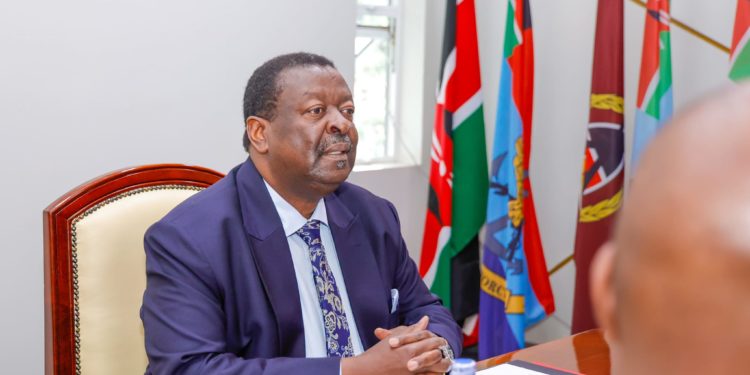The Kenyan government has pledged full transparency and guaranteed job security as it considers a potential public-private partnership (PPP) with India’s Adani Airport Holdings to modernize Jomo Kenyatta International Airport (JKIA).
Prime Cabinet Secretary Musalia Mudavadi, in a comprehensive status report, emphasized that the $2 billion proposal will undergo rigorous scrutiny and adhere strictly to legal protocols, while assuring that JKIA remains a strategic national asset that is not for sale.
“We reaffirm that the proposed expansion and modernization of JKIA will be conducted in strict adherence to our Constitution and, specifically, in accordance with the legal frameworks established under the PPP Act,” Mudavadi stated. The report explicitly addresses labor concerns, affirming that “full conformity with Kenyan Law with regard to labour issues shall be upheld.”
The potential partnership aims to address urgent infrastructure needs at East Africa’s busiest airport, which has exceeded its passenger capacity and fallen behind its development schedule. JKIA, constructed in 1978, handled over 8.6 million passengers last year, surpassing its 7.5 million annual capacity. Recent incidents, including leaking roofs and power outages, have highlighted the pressing need for upgrades.
“JKIA is 10 years behind its development schedule as per its long-term masterplan, and is lagging behind its regional competitors in terms of quality of infrastructure, innovation and technology,” the report notes. The proposed modernization would include a new passenger terminal, refurbishment of existing terminals, a second runway, and enhanced cargo handling facilities.
The government’s interest in a PPP model stems from Kenya’s tight fiscal situation. With public debt at 69.7% of GDP and debt service payments equivalent to 63% of ordinary revenue, the state is looking to leverage private sector investment to fund critical infrastructure projects.
“Given this tight fiscal space, the Government, in the Budget Policy Statement 2024, indicated that it intends to make additional infrastructure investments by leveraging on the private sector, through PPPs,” the report explains.
In March 2024, Adani Airport Holdings submitted a Privately Initiated Proposal (PIP) to the Kenya Airports Authority. While the proposal is still under review, it has sparked public interest and debate about the future of this strategic national asset.
Mudavadi emphasized that the process would follow strict legal protocols: “The proposal is currently undergoing the requisite due process, reviews and negotiations in compliance with the PPP Act whose control checks will cover; value for money assessment, stakeholder engagement, National Treasury approval, clearance by the Attorney General, Cabinet approval and, where required, approval by Parliament before any agreement can be signed.”
The government is proceeding cautiously with the potential involvement of Adani Airport Holdings. “A detailed due diligence investigation of the project proponent will be conducted, in accordance with the provisions of the PPP Act,” the report notes. This investigation will assess Adani’s suitability as an investor in a strategic Kenyan asset, as well as its financial and technical capacity.
Additionally, given JKIA’s importance to national and international security, any proposal will be subject to vetting by relevant security agencies. The government maintains that no terms have been agreed upon yet, stating, “All terms and conditions of the proposed arrangement are subject to negotiation in accordance with the provisions of the PPP Act.”
The modernization of JKIA is seen as crucial for Kenya’s economic growth and its ambitions to become a multilateral, logistics, and financial hub. The airport’s current state is described as “inconsistent with Nairobi’s status as the host of numerous multilateral, international and regional headquarters, similar to cities such as Geneva, New York, Vienna and Rome.”
If successful, the PPP arrangement could provide a model for future infrastructure development in Kenya and potentially in other African nations facing similar fiscal constraints. However, the government is also keeping its options open. “If the results of the due diligence are not satisfactory and/or the proposal is not approved, the Government will have recourse to other options for bridging the infrastructure gap at JKIA, including consideration of alternative proposals,” the report states.
The potential modernization of JKIA represents a significant moment for Kenya’s aviation sector and its broader economic ambitions. As the process unfolds, it will likely be closely watched by investors, policymakers, and citizens alike, serving as a test case for Kenya’s ability to leverage private investment for public infrastructure development while safeguarding national interests.
“We assure the public that every step of this project will undergo rigorous review and scrutiny,” Mudavadi stated.


















